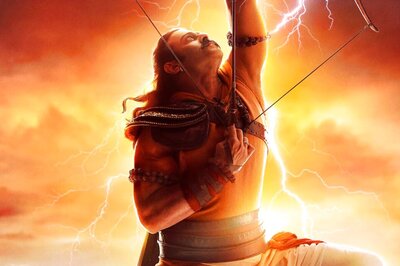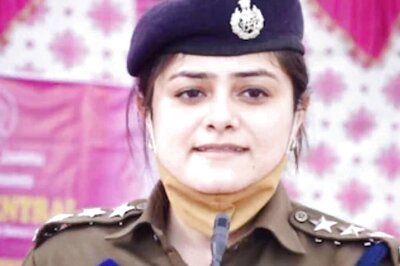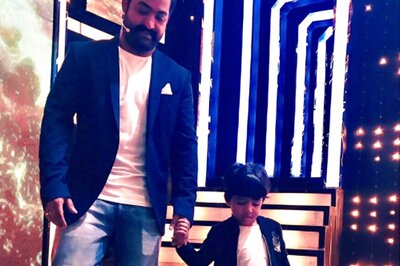
views
In a career spanning over three decades, Anupam Kher has amassed a critically-acclaimed, award-winning body of work that arguably marks him as one of the most skilful and versatile figures in the Indian film industry.
In addition to his many professional accomplishments, the veteran actor is known for being at loggerheads with his peers over their ideological differences. In December last year, Naseeruddin Shah, Kher's co-star of many films, said he did not want to engage with Kher because the latter "doesn't talk reasonably".
Shah's remark had come after Kher criticised the former for saying intolerance was rising in the country during an interview with Karwan-e-Mohabbat, a travelling activist collective.
In this interview, we spoke to Kher about how he navigates his political ideology, whether or not actors are morally culpable for things they depict on screen and his new international project Hotel Mumbai, a biographical thriller on the 26/11 Mumbai attacks. Directed by Anthony Maras, the film sees Kher in the role of Hemant Oberoi, the former executive chef of the Taj Mahal Palace hotel, Mumbai. Besides Kher, Hotel Mumbai stars Dev Patel, Armie Hammer and Nazanin Boniadi.
Excerpts from the interaction:
What did motivate you to pick up a subject like Hotel Mumbai?
Anupam Kher: It's important to tell the world what victims go through sometimes. They're becoming more and more mechanical about tragedy. Now, we have started reacting to tragedies with statistics-- 'Kitne mare (how many died)?' But even if there's one victim of terrorism, the lives of people around that person are over. I wanted to be a part of film like this so that the world knew what happened on 26/11 at the time when five-six terrorists from the neighbouring country came and gunned down so many innocents. That's what they do, gun down innocents.
How did you react to the news of the attack?
Anupam Kher: I was shooting in Bandra for some film. We first thought it was some kind of rumour. Later, we discovered that it was actually true. I went through the trauma thrice. One, as it happened. Second time, my director wanted us to actually go through the whole workshop about as if we were already there. The third time was when I saw the film. Anthony (Maras) wanted to make the film in such a manner that the spectator would feel that he or she is in this whole thing.
One thing about films based on recent tragedies is that those involved can react to what you portray on-screen. Does that impact your approach as an actor?
Anupam Kher: I would say that sincerity was more important than craft. This is a film where I had to be absolutely honest as a person than a very crafty or a skillful actor. If it is fake then I'm not paying the tributes to the victims and their families. This is one film where I have used utmost honesty after Saaransh.
Are all characters in the film based on real people?
Anupam Kher: Mine is the only character which is a real-life character. But others are an amalgamation of people's stories what the makers heard. They didn't use the name for practical reasons or maybe they didn't have the life rights of those people. I remember I called Karambir Kang, the former general manager of Taj hotel who lost his wife and two children in the tragedy, for the premiere of Hotel Mumbai. And my producer said, 'You want somebody to sit next to him because he will relive the whole thing.' When I asked him the same, he told me, 'I have witnessed the real incident, what more would this film do? I will take care of myself.' So, this is also a film about unsung heroes and how ordinary people become extraordinary under pressure.
Did you meet chef Hemant Oberoi personally?
Anupam Kher: My director didn't want me to meet him. I saw him straightaway in the audience at the Toronto International Film Festival, where the film was premiered. And, I broke down very badly on stage because that was the real hero sitting in the audience. He was not a trained soldier or a fighter. He was just an ordinary chef and he saved so many lives that day.
What was it like to collaborate with Dev Patel and Armie Hammer?
Anupam Kher: They are very professional actors. Anthony conducted a couple of workshops for us to bond together. It was so much of trauma that the director made us go through that we became like closest friends altogether.
To what degree are actors responsible for what they depict through their characters?
Anupam Kher: The point is that if you have to show good on screen, you also need to show the bad on screen. And, you need actors to show that aspect also. If tomorrow there's a film where I'm cast as villain, it won't be my personal choice that I will play it like this. But there are certain things which you as a person may not promote. I will not necessarily do a film about smoking or tobacco. That's my personal choice. But if there's something very important that I need to do, I will do that. Actors cannot get into this whole system.
Over the years, more and more celebrities have started speaking out on political issues. You have yourself been very vocal about your political views which some of your peers don't agree with...
Anupam Kher: Anybody who votes, whether he or she is vocal or not, is basically voting for somebody. Then after that they engage in hypocrisy. So, you obviously have a political inclination whether it's for this party or that party. It's some kind of ‘amrita manthan.’ We go through that phase. And, rest people know that this actor is with so and so party but that doesn't take away the human touch from each other among your friends or family.
Sometimes husband and wife, brother and sister, father and mother have different opinions from one another, but that doesn't mean they'd stop being family. I know in our profession we're supposed to be diplomatic but you have to live with yourself. If I'm running an acting school and somebody asks me, 'What are your thoughts on this?' How can I say I can't answer this? Nevertheless, if the friendship is real then I don't think it affects and if it isn't real then it doesn't matter.
Are you comfortable working with an artiste who doesn't share your political views?
Anupam Kher: How does it matter? We're not here to match ideology; we're here to work.
Follow @news18movies for more




















Comments
0 comment